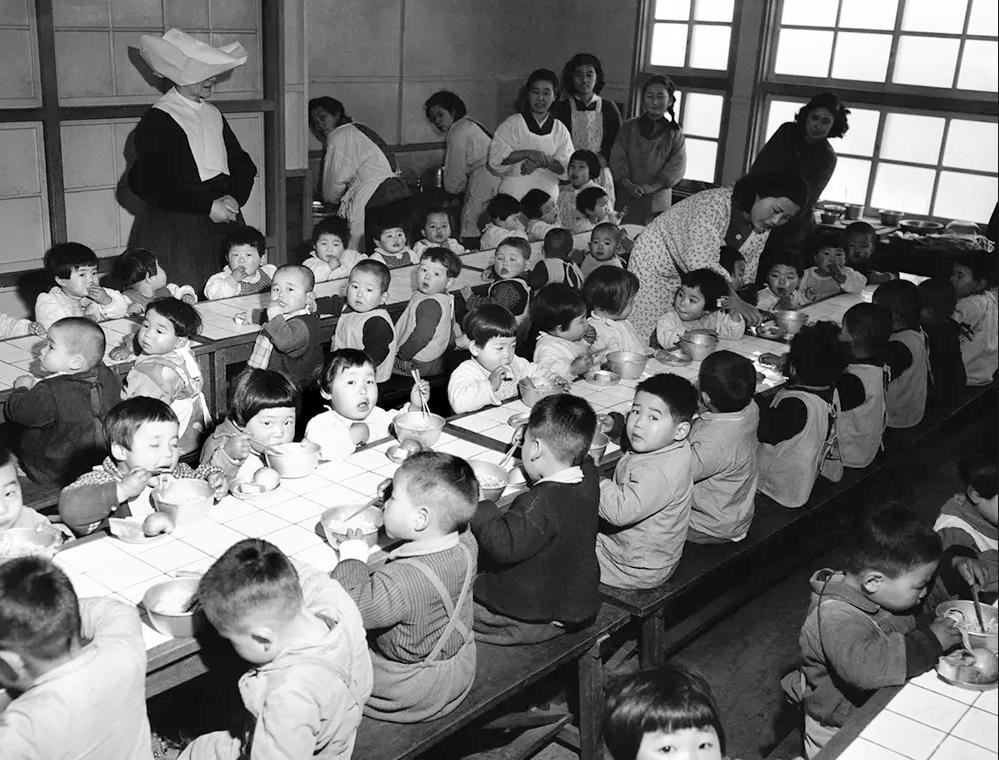
Figure 1.-TYhis is a scene at an OsakaCatholicv orphanage (1951). The 160 orphans were being fed daily wityh food purchased by the Wolfhounds, the 27th Infantry Regiment of the U.S. Army. Photographer: Jim Pringle. |

|
Raather than exploit Japan as the the Japanese had done to the countries tht they had cinquered, The Americans set sbout promoting economic recoverty,. The occupying Anetican units even took ahumanitarisn interest in Japan esoecially the children. Commonly military unit adopted orphanages to sponsor. This was a serious pronblem of orphned children, primarily as a result of the bombing. And this was a huge problem because the Japanese Government was not preared to addess the problem, both because of lack of resources and long stnding cultural traditions. Japan was a very traditional socity. Orphns without famuily connections were viewed with disdain, as scum nebeath comtempt. The ew orphnages that existed before the War were founded by charitiesi, often Christin churches. Orphaned children were lucvky to be tken in by relatives and even often not well treated. Adoption even today is problem, One source tells us, "Unfortunately adoption is not well accepted in Japan, as they are so closely linked to blood ties. Adopting can be seen as an act of shame. But when someone happens to adopt the family, they even move to another city to present the child as a son of blood." ["Adoption"] Even with the huge orphan problem, the Government did not address the problen as it should have. Humanitarian groups played a huge role, doing what they could. Am adult orphan reports, " In Japan, war orphans were punished for surviving. They were bullied. They were called trash, sometimes rounded up by police and put in cages. Some were sent to institutions or sold for labor. They were targets of abuse and discrimination. Now, 75 years after the war's end, some are revealing their untold stories of recovery and pain, underscoring Japan's failure to help its own people." [Motoki] Chtistoan churches played an outsized role in carring for war orphans and American mility units were often involved in supporting those orphanages.
Douglas, E. Sleeping with the Enemy: Japanese War Brides and the American Occupation of Japan (2013), 96p.
Motoki, Kisako in Shim Hyun-chul. "For years, orphans in Japan were punished just for surviving the war," The Korea Times (August 14, 2020).3
"Adoption of children in Japan." Suki Desu.com
Navigate the CIH World War II Section:
[Return to Main Japanese World War II: The Occupation of Japan--Interpersonal relations page]
[Return to Main Japanese World War II: The Occupation of Japan page]
[Return to Main Japanese World War II occupation page]
[Return to Main Japanese World War II aftermath page]
[About Us]
[Aftermath]
[Biographies]
[Campaigns]
[Children]
[Countries]
[Deciding factors]
[Diplomacy]
[Geo-political crisis]
[Economics]
[Home front]
[Intelligence]
[Military forces]
[POWs]
[Resistance]
[Race]
[Refugees]
[Technology]
[Totalitarian powers]
[Bibliographies]
[Contributions]
[FAQs]
[Images]
[Links]
[Registration]
[Tools]
[Return to Main World War II page]
[Return to Main war essay page]
[Return to CIH Home page]
